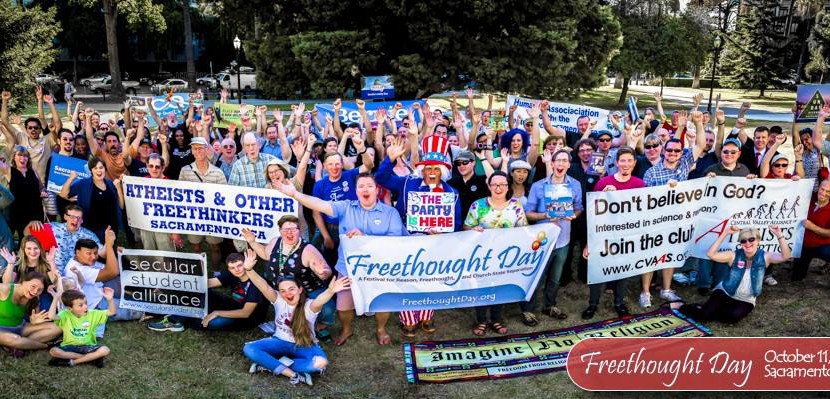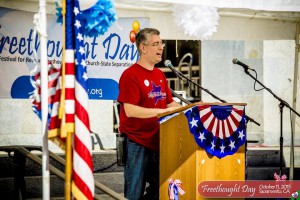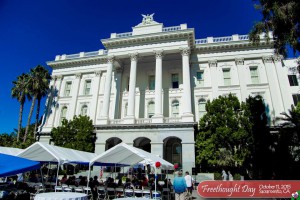Freethought Day: From Witch Trials to Reason
What do science, the First Amendment, and colonial America have in common? Freethought Day!

Photo by Matt Martin, California Freethought Day
Back in 1692, the governor of what is now Massachusetts declared that “spectral evidence” would no longer be admissible as court evidence. The days of “my neighbor is a witch and she turned my wife into a newt” were over, thus finally ending the Salem Witch Trials.
In today’s evidence-based courts, the idea of supernatural hearsay is preposterous. For that, we can thank the Puritan minister Increase Mather and his son Cotton Mather. They were concerned that innocents could be corrupt by Satan and thus shouldn’t be held accountable for their actions. Secular humanists may find that notion rather silly, but their letters earned the attention of Governor William Phips. With a stroke of the governor’s pen on October 12, 1692, nearly every charge was dropped against the accused “witches,” and many were pardoned. Hundreds of lives were saved.
[caption id="attachment_17454" align="alignright" width="300"] David Diskin (Photo by Matt Martin, California Freethought Day)[/caption]
More than three hundred years later, to commemorate this event, Freethought Day, a new holiday for those of us who feel that the paranormal has no place in court, was born. It has expanded beyond its legal-based beginnings to celebrate the separation of church and state, scientific advancement, and freedom of speech.
Many cities are joining in the celebration. Freethought Day has been recognized across the country, through events by groups such as the Florida Humanist Association and the Secular Humanist Society of New York. But it is in Sacramento, California, where Freethought Day is an annual tradition. Having started as just an afternoon at a courthouse fifteen years ago, California Freethought Day has since seen tremendous growth.
California’s event now lasts over a weekend, with auxiliary events including a fundraising reception, a Secular Leadership Day with workshops and lectures for group organizers, and a Secular Advocacy Day in partnership with the Secular Coalition for California to promote nonreligious voices at the State Capitol. The main event, also at the State Capitol, is now a six-hour outdoor festival with live music, family-friendly activities, community groups, authors and podcasters, and a slate of speakers that rival any conference.
[caption id="attachment_17455" align="alignleft" width="300"]
David Diskin (Photo by Matt Martin, California Freethought Day)[/caption]
More than three hundred years later, to commemorate this event, Freethought Day, a new holiday for those of us who feel that the paranormal has no place in court, was born. It has expanded beyond its legal-based beginnings to celebrate the separation of church and state, scientific advancement, and freedom of speech.
Many cities are joining in the celebration. Freethought Day has been recognized across the country, through events by groups such as the Florida Humanist Association and the Secular Humanist Society of New York. But it is in Sacramento, California, where Freethought Day is an annual tradition. Having started as just an afternoon at a courthouse fifteen years ago, California Freethought Day has since seen tremendous growth.
California’s event now lasts over a weekend, with auxiliary events including a fundraising reception, a Secular Leadership Day with workshops and lectures for group organizers, and a Secular Advocacy Day in partnership with the Secular Coalition for California to promote nonreligious voices at the State Capitol. The main event, also at the State Capitol, is now a six-hour outdoor festival with live music, family-friendly activities, community groups, authors and podcasters, and a slate of speakers that rival any conference.
[caption id="attachment_17455" align="alignleft" width="300"] (Photo by Matt Martin, California Freethought Day)[/caption]
This year, the event even has the recognition of California’s Lieutenant Governor Gavin Newsom, and several candidates for elected offices throughout California are expected to attend—proving that being openly secular isn’t a recipe for political disaster.
The event’s organizers encourage everyone to join in the celebration – either by attending, sponsoring, or even planning another Freethought Day event in their city or state. For more information about this year’s event, visit FreethoughtDay.org. But hurry—Freethought Day is officially October 12, and it is observed on October 16 in California.
(Photo by Matt Martin, California Freethought Day)[/caption]
This year, the event even has the recognition of California’s Lieutenant Governor Gavin Newsom, and several candidates for elected offices throughout California are expected to attend—proving that being openly secular isn’t a recipe for political disaster.
The event’s organizers encourage everyone to join in the celebration – either by attending, sponsoring, or even planning another Freethought Day event in their city or state. For more information about this year’s event, visit FreethoughtDay.org. But hurry—Freethought Day is officially October 12, and it is observed on October 16 in California.
